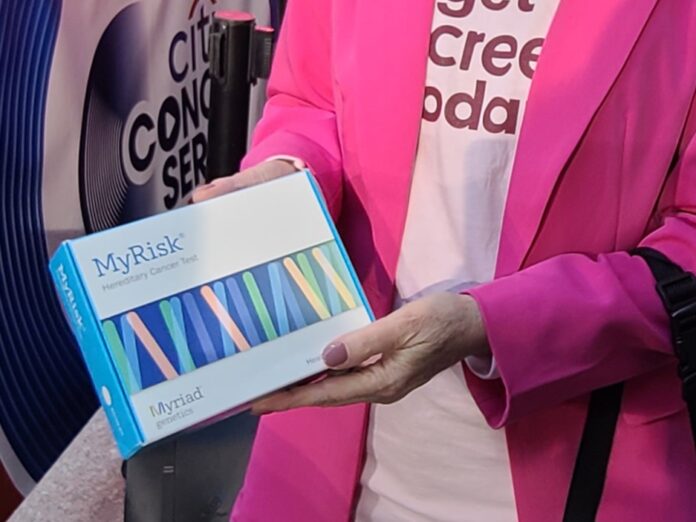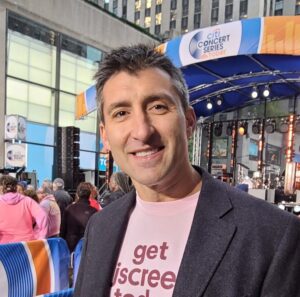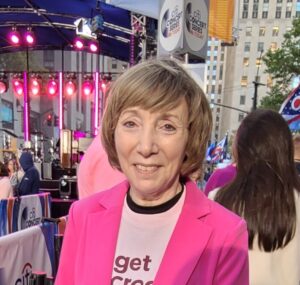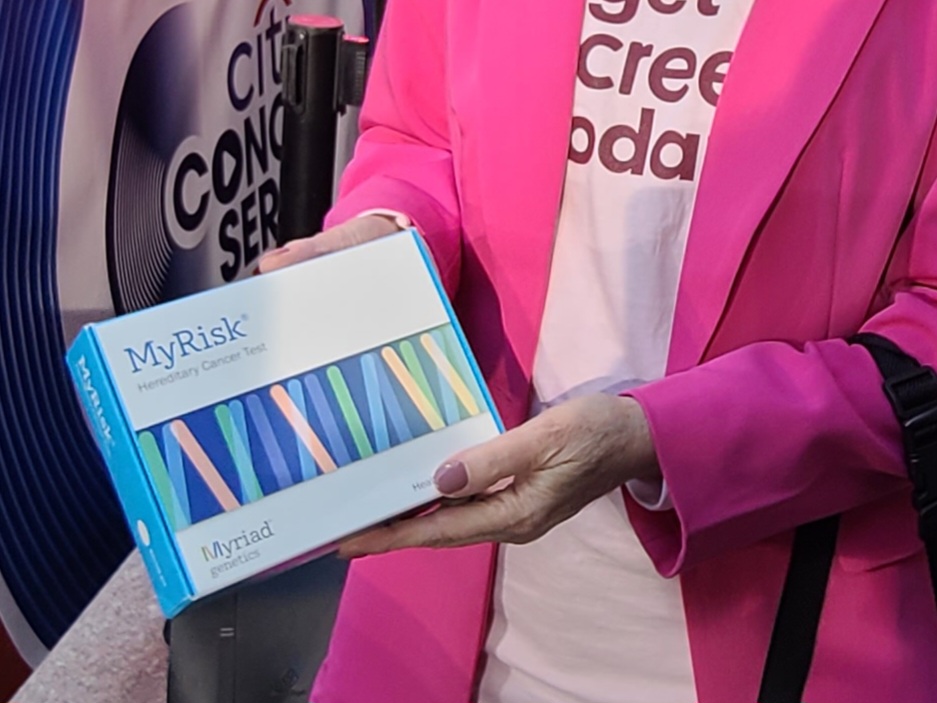 MyRisk genetic screening kit that was distributed to 350 participants at the Pink Power Hour [Corinna Singleman]
MyRisk genetic screening kit that was distributed to 350 participants at the Pink Power Hour [Corinna Singleman]
October 1st sparks the start of Breast Cancer Awareness Month. It was also the day that jscreen, in partnership with The TODAY Show and Mount Sinai Cancer Center, chose to raise awareness for cancer screening.
 Pink Power participant accepting kit from jscreen executive director Karen Grinzaid and CEO Matt Goldstein, MD, PhD, pictured left to right. [Michael Priest Photography]Hundreds of people gathered in the chilly pre-dawn streets of New York City to attend the event dubbed: Pink Power Hour. This event focused on collecting the most people to sign up for genetic screening in a single hour, culminating in 350 participants. In addition to getting their kits for free, the participants enjoyed a live performance by Sheryl Crow, herself a breast cancer survivor.
Pink Power participant accepting kit from jscreen executive director Karen Grinzaid and CEO Matt Goldstein, MD, PhD, pictured left to right. [Michael Priest Photography]Hundreds of people gathered in the chilly pre-dawn streets of New York City to attend the event dubbed: Pink Power Hour. This event focused on collecting the most people to sign up for genetic screening in a single hour, culminating in 350 participants. In addition to getting their kits for free, the participants enjoyed a live performance by Sheryl Crow, herself a breast cancer survivor.
 Crowd at Pink Power Hour [Corinna Singleman]Genetic screening has become a powerful diagnostic tool and resource for doctors working on personalized medicine for their patients. Cancer screening is becoming an important component of patient care, but it is not yet ubiquitous in healthcare.
Crowd at Pink Power Hour [Corinna Singleman]Genetic screening has become a powerful diagnostic tool and resource for doctors working on personalized medicine for their patients. Cancer screening is becoming an important component of patient care, but it is not yet ubiquitous in healthcare.
 Matthew Goldstein, MD, PhD, CEO of jscreen [Corinna Singleman]“Genetics [are] complicated,” Matthew Goldstein, MD, PhD, CEO of jscreen explained to Inside Precision Medicine. “It’s complicated to understand what the right test is to order. It’s complicated to understand what to do with that information. It’s complicated to help individuals navigate insurance in many cases.” He shared that, despite its complicated nature, genetic screening is a valuable resource for individuals, communities, and clinicians to make healthcare easier.
Matthew Goldstein, MD, PhD, CEO of jscreen [Corinna Singleman]“Genetics [are] complicated,” Matthew Goldstein, MD, PhD, CEO of jscreen explained to Inside Precision Medicine. “It’s complicated to understand what the right test is to order. It’s complicated to understand what to do with that information. It’s complicated to help individuals navigate insurance in many cases.” He shared that, despite its complicated nature, genetic screening is a valuable resource for individuals, communities, and clinicians to make healthcare easier.
 Karen Grinzaid, founding executive director of jscreen [Corinna Singleman]
Karen Grinzaid, founding executive director of jscreen [Corinna Singleman]
His colleague, founding executive director of jscreen, Karen Grinzaid, who is a genetic counselor by training, concurred, “I know that genetic testing can be scary, but it can really help inform your future. And I just want people to understand this doesn’t mean that you have cancer, it means that you can prevent cancer and lead a healthy life.”
They both stressed that genetic screening can be a useful step in maintaining a healthy life for yourself and for your children through cancer and reproductive genetic screenings.
At the event, IPM spoke in more detail with Goldstein and Grinzaid.
The following interview has been edited for length and clarity.
IPM: Today’s an exciting day. You’re attempting to get a record number of sign-ups for genetic screenings, all in one event. Can you tell me a little bit about why you’re doing this, and why now specifically?
Grinzaid: We want to set a world record for the most people signing up for hereditary cancer testing. The reason this is so important today is it’s the beginning of Breast Cancer Awareness Month. We realize that there’s not enough education out there about the benefits of the predatory cancer testing to inform a person’s healthcare. And we want to just get the word out and get as many people tested as possible.
Goldstein: The ability to screen for genes and variants that can lead to cancers, is one of the most powerful things we can do to intervene on disease. And we are kicking off Breast Cancer Awareness Month with an attempt to give away 350 free genetic screens in partnership with Myriad Genetics, Mount Sinai, and of course, Jill Martin and The TODAY Show. And it’s a way to raise awareness and to make people recognize how powerful this technology and capability is.
IPM: Can you tell us a little bit more detail about how you do the screening? There’s a lot of different methods for and a lot of approaches for sequencing DNA. What approaches do you use?
Grinzaid: With the jscreen program, we are trying to make screening easier for you. The test itself is done from the individual’s home. They sign up online, they get a saliva kit in the mail, they send their sampling to the lab, and the results are returned with telehealth via a genetic counselor.
The technology that’s used is Next-Generation Sequencing (NGS). We run a panel of genes that include those that would increase a person’s risk of hereditary cancer. It’s a 48 gene panel, and we’re working with Myriad Genetics on this panel. We’re trying to give people information about their risk for 11 different types of cancer through this test.
The test itself is medical grade. We’re working with a CLIA & CAP accredited laboratory, and you’re getting information back that’s comprehensive. We follow HIPAA guidelines, so even though it feels direct to consumer because you’re testing from home, it’s a medical grade test.
IPM: How does the genetic counseling component work through jscreen?
Grinzaid: We do telehealth either via video or phone, depending on what’s convenient for the individual. We’re not using technology other than the fact that it’s telehealth. We do some pre-test education via [pre-produced] video, and then the follow-up counseling is done with one of our genetic counselors directly.
IPM: Let’s say that there’s a patient who gets their test results, meets with a genetic counselor and there is something concerning in their results. What is the next step?
Grinzaid: Absolutely, this is really important. We’re a national program, and we’re talking to people wherever they live in the U.S. But it’s very important that they connect with their primary care physician, with a specialty care physician, depending on their results. So, for example, let’s say someone tested positive for a BRCA mutation. We know then, they have a risk for breast cancer, or prostate cancer, or pancreatic cancer. We want to help them get to a specialist that can help them do whatever screening they need and monitoring so that they’ll understand next steps. We also follow up with individuals a couple of weeks later, six months later, to make sure they understand and are being proactive about their health.
IPM: Today is focused on cancer screening, but jscreen started over a decade ago with the intention of having reproductive screening, predominantly for members of the Jewish community in America. That goal seems to have expanded, especially with the partnership with Myriad Genetics. Can you tell me a little bit about the growth of jscreen and Myriad?
Goldstein: Yeah. These issues are obviously significant in certain populations. Genetic diseases are more common in certain populations, like the Jewish population, as an example. But this is really an everyone, everywhere issue. We at jscreen aspire to provide world-class genetic care navigation to everyone everywhere.
We’re actually really bad at knowing what our own genetic ancestry is. So, even if we think we’re not from a high-risk population, we oftentimes don’t really know. And that’s the power of this very simple, very easy, and relatively inexpensive test that can change lives and can save lives.
IPM: Dr. Goldstein, you became CEO about two years ago, can you tell me a little bit about what brought you to jscreen, about your background, your experience?
Goldstein: I trained as an MD-PhD, did my clinical training in internal medicine, and then spent about a decade developing medicines in biotech and helped to build two biotech companies making medicines for cancer. Along the way, I met and married a beautiful woman, and we decided to start a family. We both are Jewish by background and had reproductive carrier screening prior to my wife getting pregnant.
Our first daughter, Havi, was born on our wedding anniversary in 2018, developed normally for about a year and then started to miss some milestones. And after a very painful and confusing diagnostic odyssey, we learned that she had Tay-Sachs disease. And she died about a year later, a year and a half later, and it turned my world upside down.
In trying to understand how that happened, I learned that the physician who had ordered my test ordered the wrong test. And I just couldn’t believe that happened in today’s day and age. It led me to a deeper exploration of the space and of preventive genetics more specifically.
We have such incredible capability in genetics and genomics, and it is one of the most powerful tools to intervene on disease. And we don’t really use it in medicine, which is shocking and frankly appalling. When I learned about what iscreen does in terms of education, awareness, access to testing, support to and through the process, ensuring individuals know what to do with that information. I said, this should be everywhere. You know, this should be something that is a resource for individuals and communities and clinicians. And after spending about a year informally advising them, I joined full-time to try and transform what we do and bring it to everyone everywhere.
IPM: I’m so sorry for your loss. It’s heartbreaking.
Goldstein: I miss her every day. And she is such an incredible force in making this work real. And the fact that I get to bring her in this way into everything we do, into The TODAY Show at Rockefeller Plaza—it’s my way of being a parent and I’m grateful for that.
IPM: That’s beautiful. So, you had a situation where the doctor ordered the incorrect tests and in turn misrepresented what your carrier status was. It seems jscreen is trying to prevent that from happening to others. How are they doing that?
Goldstein: Yeah, I think that quality of testing is paramount. And that starts from the first moment that someone lands on the website and starts to fill out information to make sure that we’re getting them the right test that is appropriate for them in their circumstance.
We have a team of genetic counselors who reviews every single registration that comes through that follows that individual’s case from the kit being sent to their home, to the sample being collected and run at the lab, to the report being generated and the results being shared. And we work right now with a fantastic partner in Myriad Genetics, who’s been around for a very long time and is a super high quality and also equally committed organization.
There’s lots of fail safes and double checks and systems in place to make sure that we’re doing everything we can to ensure that the right test is being given and offered and run for the right individual.
IPM: Are there any other things on the horizon that you expect for genetic testing because there’s such a wide breadth of options there. What are you looking at in the next two, five, 10 years?
Goldstein: I think there’s a number of really exciting areas. Hereditary cardiovascular disease is probably the lowest hanging fruit in terms of the next type of panel that we’ll be adding. But look, as our knowledge of genotype-phenotype or gene-disease relationships gets better and better, we’re going to start to see a whole slew of different areas become ripe for this kind of testing. Neurologic disease, autoimmune disease, I think we’re just at the beginning of what is going to be an incredible era of using this capability to make meaningful change.

